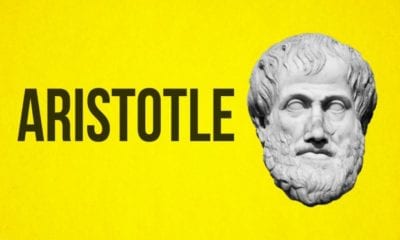Change Your Mindset
35 Quotes to Inspire You to Live a Life of Contribution

Contribution is defined as something that you contribute or do to help produce or achieve something together with other people or to help make something successful. May these quotes inspire you to make a positive contribution to the world so that you may help advance humanity to a greater level.
Here are 35 quotes to inspire you to live a life of contribution:
1. “You’re happiest while you’re making the greatest contribution.” – Robert F. Kennedy
2. “The best contribution one can make to humanity is to improve oneself.” – Frank Herbert
3. “Every individual in the world has a unique contribution.” – Jack Kornfield
4. “It’s the ultimate luxury to combine passion and contribution. It’s also a very clear path to happiness.” – Sheryl Sandberg
5. “The quality of your life will be determined by the quality of your contribution. When you work to improve the lives of others, your life improves automatically.” – Kurek Ashley
6. “We must try to contribute joy to the world. That is true no matter what our problems, our health, our circumstances. We must try. I didn’t always know this and am happy I lived long enough to find it out.” – Roger Ebert
7. “I feel that my whole life is a contribution.” – Pete Seeger
8. “Every contribution counts. Everyone can make a difference. Just start with yourself.” – Anonymous
9. “Your rewards in life are always in direct proportion to your contribution – your service.” – Earl Nightingale
10. “Success is making a positive difference to other people, especially seeing others grow, succeed and thrive as a result of your own small contribution.” – Azran Osman Rani
11. “Success must include two things: the development of an individual to his utmost potentiality and a contribution of some kind to one’s world.” – Eleanor Roosevelt
13. “You have brilliance in you, your contribution is valuable, and the art you create is precious. Only you can do, and you must.” – Seth Godin
14. “Never think that what you have to offer is insignificant. There will always be someone out there that needs what you have to give.” – Anonymous
15. “It is in your hands to create a better world for all who live in it.” – Nelson Mandela
16. “You look out there and there’s people that, their day is changed because of your contribution to it.” – Brad Paisley
17. “Let your actions contribute to advancing humanity to a greater level.” – ATGW
18. “I have a contribution to make.” – Lauren Bacall
19. “Your contribution to the world are significant gifts to humanity.” – Amy Larson
20. The key to life is not accumulation, it is contribution.” – Stephen Covey
21. “Great ambition and conquest without contribution is without significance. What will your contribution be?” – Anonymous
22. “Life is about growth and contribution, not perfection.” – Anonymous
23. “Treat your new job as a mission. Avoid procrastination. Increase contribution. Exceed expectations.” – Anonymous
24. “Our contribution purely depends on our consciousness and our willingness to support those in need, to show vulnerability and accept the support of others, to share without expecting the credit, to give it our all and allow our hard work to determine the outcome.” – Yehuda Berg
25. “When you are making a success of something, it’s not work. It’s a way of life. You enjoy yourself because you are making your contribution to the world.” – Andrew Grantelli
26. “Don’t cheat the world of your contribution. Give it what you’ve got.” – Steven Pressfield
27. “Replace your pursuit of success with the pursuit of contribution.” – Peter Drucker
29. “Most people set goals to get. There is a better way. Instead, try setting your goals, based on personal growth and contribution to others.” – Eric Worre
30. “Success is not a function of the size of your title but the richness of your contribution.” – Robin Sharma
31. “The single biggest contribution you can make is to step into your greatness. Let your own unique magnificence blossom.” – Jane Lee Logan
32. “What a privilege to be here on the planet to contribute your unique donation to mankind.” – Morris Dees
33. “Only once you give yourself permission to stop trying to do it all, to stop saying yes to everyone, can you make your highest contribution towards the things that really matter.” – Greg McKeown
34. “It is not position but contribution that makes a leader.” – Apoorve Dubey
Which contribution quote was your favorite and why? Comment below!
Change Your Mindset
The Leadership Skill Nobody Talks About (But Changes Everything)
Curiosity often takes a back seat to certainty and gets labeled as a soft skill, which makes it sound obvious and easy

Most of us, when faced with challenges, instinctively seek certainty and answers. In turn, our ego steps in and prompts us to defend our views, double down, or perhaps disengage. (more…)
Personal Development
Want to Change the World? Start by Sharing Your Knowledge
When we’re exposed to new perspectives, our thinking expands, and so does our potential to create

The Power of Ideas
In October 1904, during a thirty-six-hour train journey from Johannesburg to Durban, Mahatma Gandhi read Unto This Last by John Ruskin, a book that would radically alter the course of his life. Reflecting on that night, Gandhi said, “I could not get any sleep. I was determined to change my life by the ideals of the book.” (more…)
Personal Development
Burned Out at Your Desk? Try This 5-Minute Mental Reset
This kind of fatigue doesn’t always feel dramatic, but it’s deadly for momentum

Change Your Mindset
You Become What You Absorb: How Input Shapes Your Life
We let the world dictate who we spend time with and what input we allow in, rarely stopping to consider the effects it’s having on us

“Input” is anything from the outside world that influences your mood, mindset, and emotional state. It includes the media you consume, the books you read, the podcasts and music you listen to, and the movies and shows you watch. But it also encompasses much more: the environment you live and work in, the conversations you have, the people you surround yourself with, and the events, personal or global, that unfold around you. (more…)
-

 Personal Development4 weeks ago
Personal Development4 weeks agoWant to Change the World? Start by Sharing Your Knowledge
-

 Success Advice3 weeks ago
Success Advice3 weeks agoThe One Mindset Shift That Made Me Irreplaceable At Work
-

 Scale Your Business3 weeks ago
Scale Your Business3 weeks agoWhy Smart Entrepreneurs Never Skip This One Business Expense
-

 Success Advice2 weeks ago
Success Advice2 weeks agoHow Playing by the Rules Became the Smartest Business Strategy
-

 Did You Know2 weeks ago
Did You Know2 weeks ago7 Surprising Life Lessons Video Games Taught Me That School Never Did
-

 Success Advice2 weeks ago
Success Advice2 weeks agoHow to Build Trust, Kill Micromanagement, and Lead a Team That Thrives
-

 Scale Your Business2 weeks ago
Scale Your Business2 weeks agoHow to Build a Workplace People Actually Want to Show Up To
-

 Success Advice1 week ago
Success Advice1 week agoSuccess Isn’t Sexy: 5 Daily Habits That Actually Work






























3 Comments